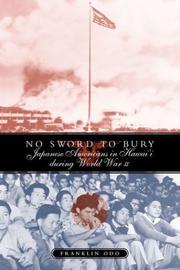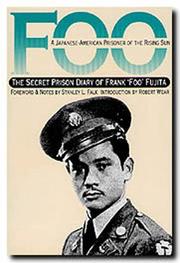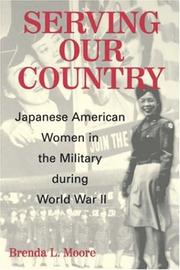| Listing 1 - 10 of 13 | << page >> |
Sort by
|
Book
ISBN: 9780520950368 9780520262232 9780520280212 Year: 2011 Publisher: Berkeley University of California Press
Abstract | Keywords | Export | Availability | Bookmark
 Loading...
Loading...Choose an application
- Reference Manager
- EndNote
- RefWorks (Direct export to RefWorks)
Race for Empire offers a profound and challenging reinterpretation of nationalism, racism, and wartime mobilization during the Asia-Pacific war. In parallel case studies--of Japanese Americans mobilized to serve in the United States Army and of Koreans recruited or drafted into the Japanese military--T. Fujitani examines the U.S. and Japanese empires as they struggled to manage racialized populations while waging total war. Fujitani probes governmental policies and analyzes representations of these soldiers--on film, in literature, and in archival documents--to reveal how characteristics of racism, nationalism, capitalism, gender politics, and the family changed on both sides. He demonstrates that the United States and Japan became increasingly alike over the course of the war, perhaps most tellingly in their common attempts to disavow racism even as they reproduced it in new ways and forms.
Imperialism --- Racism --- Nationalism --- World War, 1939-1945 --- History --- Social aspects --- Participation, Japanese American
Book
ISBN: 9780415711296 9781138629233 9781315884615 9781134651931 9781134652006 1315884615 0415711290 1138629235 Year: 2014 Publisher: Abingdon, Oxon ; New York, NY : Routledge,
Abstract | Keywords | Export | Availability | Bookmark
 Loading...
Loading...Choose an application
- Reference Manager
- EndNote
- RefWorks (Direct export to RefWorks)
"Since the early 1990s, there has been a clear evolution in the military dimension of Japanese diplomacy. From Gulf War I in 1991 to the present day, an incremental but unmistakable acceptance of, and resort to, military dispatches has taken place, and yet crucially, Japan has not morphed into a traditional military power. Exploring Japan's involvement in both Afghanistan and Iraq, this book examines the evolution and nature of the new civil-military dimension in Japanese foreign policy. It shows how foreign aid, Japan's traditional non-military diplomatic tool, was merged with the operations of the Japanese Self-Defense Force in Iraq and the activities of NATO-ISAF forces in Afghanistan, and emphasises the centrality of civilian power to Japanese foreign policy and diplomacy. However, Dennis Yasutomo argues that while a new civil-military security culture is replacing the old merchant state culture of pacifism and anti-militarism, Japan does not yet qualify as a military "normal nation". Further, the book's exploration of the increased utilization of military power within the context of civilian objectives and non-military diplomatic instruments, sheds light on the current build-up of Japanese military power in East and Southeast Asia amid territorial disputes and nuclear threats, and highlights the impact that Japan's new civil-military diplomacy may have on wider international affairs in the 21st Century.Drawing on interviews with key actors in Tokyo, as well as with practitioners who have served on the ground in Iraq and Afghanistan, this book will have broad appeal to students and scholars working on Japanese politics and diplomacy, military and security studies and international relations. "--
Civil-military relations --- Iraq War, 2003-2011 --- Afghan War, 2001 --- -Relations pouvoir civil-pouvoir militaire --- Guerre en Irak, 2003-2011 --- Guerre en Afghanistan, 2001 --- -Participation, Japanese --- Participation, Japanese --- Participation japonaise --- Japan --- Japon --- Military policy. --- Foreign relations. --- Politique militaire --- Relations extérieures --- -Participation, Japanese. --- Participation, Japanese. --- Military policy --- Foreign relations --- Guerre en Afghānistān, 2001 --- Relations extérieures --- Afghan War, 2001-2021 --- Relations pouvoir civil-pouvoir militaire --- Civil-military relations - Japan --- Iraq War, 2003-2011 - Participation, Japanese --- Afghan War, 2001- - Participation, Japanese --- Japan - Military policy --- Japan - Foreign relations --- -Japan

ISBN: 1592132073 9781592132072 1592132707 9781592132706 Year: 2004 Publisher: Philadelphia Temple University Press
Abstract | Keywords | Export | Availability | Bookmark
 Loading...
Loading...Choose an application
- Reference Manager
- EndNote
- RefWorks (Direct export to RefWorks)
"When bombs rained down on Pearl Harbor in 1941, Japanese American college students were among the many young men enrolled in ROTC and called upon to defend the islands against invasion immediately after the attack. In a matter of weeks, however, the military government questioned their loyalty and disarmed them." "In No Sword to Bury, Franklin Odo places the largely untold story of the wartime experience of these young men in the context of the community created by their immigrant families and its relationship to the larger, white-dominated society. At the heart of the book are vivid oral histories that recall the young men's service on the home front in the Varsity Victory Volunteers, a non-military group dedicated to public works, as well as in the segregated 442[superscript d] Regimental Combat Team that fought in Europe and served in the military intelligence. Odo shows how their wartime experiences and their post-war success in business and politics contributed to the simplistic view of Japanese Americans as a model minority in Hawai'i and glossed over significant differences in their lives and perspectives. This, then, is a book about a critical moment in ethnic identity formation among the first generation of Americans of Japanese descent (the nisei) as well as a history of their community during the war."--BOOK JACKET.
Japanese Americans --- Pearl Harbor (Hawaii), Attack on, 1941 --- World War, 1939-1945 --- Participation, Japanese American --- Hawaii --- Ethnic relations.
Book
ISBN: 0295804467 9780295804460 9780295992099 0295992093 Year: 2012 Publisher: Seattle University of Washington Press
Abstract | Keywords | Export | Availability | Bookmark
 Loading...
Loading...Choose an application
- Reference Manager
- EndNote
- RefWorks (Direct export to RefWorks)
World War, 1939-1945 --- Japanese American soldiers --- Japanese American military personnel --- Nisei soldiers --- Soldiers, Japanese American --- Soldiers --- Japanese Americans. --- Participation, Japanese American. --- History --- Hood River (Or.) --- City of Hood River (Or.) --- Ethnic relations
Book
ISBN: 3956507614 9783956507618 Year: 2021 Publisher: [Würzburg] : Ergon,
Abstract | Keywords | Export | Availability | Bookmark
 Loading...
Loading...Choose an application
- Reference Manager
- EndNote
- RefWorks (Direct export to RefWorks)
"Bringing together renowned scholars and emerging scholars from Japan, the United States, and Europe, this volume addresses and challenges past and present Olympic narratives and legacies in Japan. In contrast to existing research, the contributions of the sixteen sport scientists from historical, sociological, and cultural studies perspectives will not only revisit established narratives, but also bring to light the hidden and marginalized narratives and legacies at the periphery or in the shadows of official discourses. Andreas Niehaus is a Japanologist with a focus on Japanese sports history and Yabu Kotaro is a sports historian specializing in Japanese martial arts."--
Jeux olympiques --- Nationalism and sports --- Nationalism and sports. --- Nationalisme et sports --- Olympics --- Sports --- Participation japonaise --- Histoire --- Aspect politique. --- Participation, Japanese --- History --- Political aspects. --- Aspect social --- Social aspects --- Social aspects. --- Japan.
Book
Year: 2006 Publisher: Washington, DC : Department of the Army,
Abstract | Keywords | Export | Availability | Bookmark
 Loading...
Loading...Choose an application
- Reference Manager
- EndNote
- RefWorks (Direct export to RefWorks)
World War, 1939-1945 --- World War, 1939-1945 --- Translating services --- Japanese Americans --- Participation, Japanese American. --- Military intelligence --- History --- History --- United States. --- Military Intelligence Service Language School (U.S.) --- History.
Book
Year: 2015 Publisher: Arlington, VA : American Battle Monuments Commission,
Abstract | Keywords | Export | Availability | Bookmark
 Loading...
Loading...Choose an application
- Reference Manager
- EndNote
- RefWorks (Direct export to RefWorks)
World War, 1939-1945 --- Japanese Americans --- Japanese American soldiers --- Participation, Japanese American. --- Japanese Americans. --- Forced removal and internment, 1942-1945. --- History --- Akimoto, John. --- Akimoto, Ted. --- Akimoto, Victor. --- Akimoto family --- History.
Book
ISBN: 0520035240 9780520035249 Year: 1978 Publisher: Berkeley University of California press
Abstract | Keywords | Export | Availability | Bookmark
 Loading...
Loading...Choose an application
- Reference Manager
- EndNote
- RefWorks (Direct export to RefWorks)
World War, 1939-1945 --- Morale. --- Military discipline --- Sociology, Military. --- Participation, Japanese American. --- Army Language School (U.S.) --- 316.42 --- -Morale --- Sociology, Military --- -316.66 --- European War, 1939-1945 --- Second World War, 1939-1945 --- World War 2, 1939-1945 --- World War II, 1939-1945 --- World War Two, 1939-1945 --- WW II (World War, 1939-1945) --- WWII (World War, 1939-1945) --- History, Modern --- Military sociology --- Armed Forces --- Armies --- Peace --- War --- War and society --- Esprit de corps --- Mind, State of --- State of mind --- Social psychology --- Discipline, Military --- Disciplinary power --- Discipline --- Social change. Sociale ontwikkeling. Sociale veranderingen. Modernisering. Evolutie .Sociale revolutie. Modernisme --- Participation, Japanese American --- Rolgedrag. Sociale status. Sociale rol --- United States. --- Military Intelligence Service Language School (U.S.) --- Defense Language Institute (U.S.). --- 316.66 Rolgedrag. Sociale status. Sociale rol --- 316.42 Social change. Sociale ontwikkeling. Sociale veranderingen. Modernisering. Evolutie .Sociale revolutie. Modernisme --- Morale --- 316.66 --- World War, 1939-1945 - Participation, Japanese American. --- Military discipline - United States.

ISBN: 0585270562 9780585270562 0929398467 9780929398464 1574411314 9781574411317 Year: 1993 Volume: no. 1 Publisher: Denton, Tex. University of North Texas Press
Abstract | Keywords | Export | Availability | Bookmark
 Loading...
Loading...Choose an application
- Reference Manager
- EndNote
- RefWorks (Direct export to RefWorks)
During his time as a POW, Frank "Foo" Fujita kept a diary of daily happenings, embellished with drawings of life in the camp. He secreted the diary in the walls of his barracks, as the practice was forbidden. That diary forms the basis of these memoirs. Fujita's memoirs are also unique in that he was one of the fewer than nine hundred Americans taken prisoner on the island of Java. The bulk of American POWs in Japanese hands surrendered in the Philippines, and most of the published POW memoirs reflect their experience. Fujita's account of the defense of Java and of the fate of the "Lost Battalion" of Texas artillerymen serves to distinguish this memoir from others. At one point while a POW in Japan, Fujita was forced to be part of the Japanese radio group broadcasting propaganda. After the war, he testified at some of the war crime trials in San Francisco, and the diary on which this book is based was used as evidence in those trials.
World War, 1939-1945 --- Prisoners of war --- History & Archaeology --- History - General --- Exchange of prisoners of war --- POWs (Prisoners of war) --- War prisoners --- Prisoners --- European War, 1939-1945 --- Second World War, 1939-1945 --- World War 2, 1939-1945 --- World War II, 1939-1945 --- World War Two, 1939-1945 --- WW II (World War, 1939-1945) --- WWII (World War, 1939-1945) --- History, Modern --- Prisoners and prisons, Japanese. --- Personal narratives, American. --- Participation, Japanese American. --- Prisoners and prisons, Japanese --- Personal narratives, American --- Participation, Japanese-American --- Biography --- Fujita, Frank, --- Fujita, Foo,

ISBN: 0813571103 0813535220 9780813535227 9780813571102 0813532787 9780813532783 0813532779 9780813532776 0813532787 9780813532783 Year: 2003 Publisher: New Brunswick, NJ
Abstract | Keywords | Export | Availability | Bookmark
 Loading...
Loading...Choose an application
- Reference Manager
- EndNote
- RefWorks (Direct export to RefWorks)
Following the 1941 attack on Pearl Harbor and America's declaration of war on Japan, the U.S. War Department allowed up to five hundred second-generation, or "Nisei," Japanese American women to enlist in the Women's Army Corps and, in smaller numbers, in the Army Medical Corps. Through in-depth interviews with surviving Nisei women who served, Brenda L. Moore provides fascinating firsthand accounts of their experiences. Interested primarily in shedding light on the experiences of Nisei women during the war, the author argues for the relevance of these experiences to larger questions of American race relations and views on gender and their intersections, particularly in the country's highly charged wartime atmosphere. Uncovering a page in American history that has been obscured, Moore adds nuance to our understanding of the situation of Japanese Americans during the war.
Japanese American women soldiers --- Japanese-American women --- World War, 1939-1945 --- Women, Japanese American --- Women --- Women soldiers, Japanese American --- Women soldiers --- History. --- Participation, Japanese American. --- United States. --- WAC --- W.A.C. (Women's Army Corps) --- Women's Army Corps (U.S.) --- United States --- Ethnic relations. --- Japanese American women
| Listing 1 - 10 of 13 | << page >> |
Sort by
|

 Search
Search Feedback
Feedback About UniCat
About UniCat  Help
Help News
News